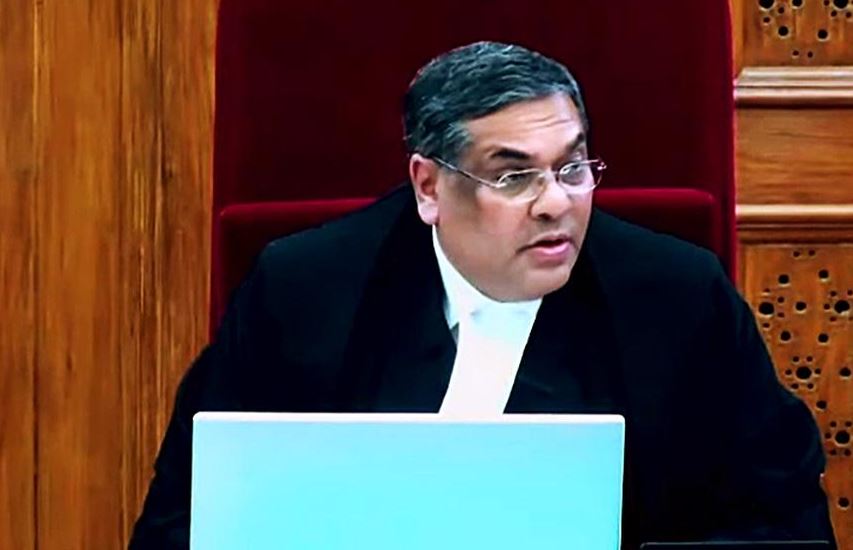Supreme Court Justice Sanjiv Khanna’s recent recusal from reviewing pleas on same-sex marriage has sparked procedural adjustments within the apex court, highlighting ongoing legal complexities and societal debates.
A Closer Look at Justice Sanjiv Khanna’s Recusal
Justice Sanjiv Khanna, one of the senior-most judges in the Supreme Court, has opted out of deliberating on petitions seeking a review of last year’s Supreme Court ruling that denied legal recognition to same-sex marriages. Citing personal reasons for his decision, Justice Khanna’s recusal necessitates the formation of a new five-judge constitution bench by Chief Justice D Y Chandrachud to address these critical review petitions.
Legal Dynamics and Constitutional Implications
Contextualizing the Supreme Court’s Stance on Same-Sex Marriage
Last year, a landmark verdict by a five-judge bench led by Chief Justice Chandrachud declined to grant legal recognition to same-sex marriages under existing Indian law. This decision, while acknowledging the rights of queer individuals, underscored the necessity for legislative intervention to formalize such unions legally.
Impact of Justice Khanna’s Recusal
Justice Khanna’s recusal has necessitated the reconstitution of a new bench to reconsider the review petitions, signaling a pivotal moment in the judiciary’s approach to LGBTQIA+ rights in India. The move reflects the personal nature of judicial decisions and their profound implications on legal proceedings.
Procedural Adjustments and Legal Precedents
Revisiting the Supreme Court’s Previous Ruling
In October last year, the Supreme Court, through a comprehensive judgment, emphasized that while transgender individuals in heterosexual relationships retain the right to marry under existing statutes, the legal recognition of same-sex marriages requires legislative action. This stance affirmed the judiciary’s role in interpreting laws while urging legislative reforms to reflect evolving societal norms.
Diverse Judicial Perspectives on Same-Sex Marriage
Insights from the Bench: Judicial Opinions and Dissent
The original verdict on same-sex marriage saw a range of judicial opinions, with justices offering distinct perspectives on the constitutional rights of LGBTQIA+ individuals. While unanimity prevailed in denying immediate legal recognition, dissenting voices highlighted the need for broader societal acceptance and legal reforms to ensure equality and dignity for all citizens.
Societal Impact and Advocacy Efforts
LGBTQIA+ Activism and Legal Advocacy
Following the decriminalization of consensual homosexual acts in 2018, LGBTQIA+ rights activists have continued to advocate for legal recognition of same-sex marriages. Their efforts extend beyond marriage rights to include adoption, parental rights in education, financial entitlements, and succession benefits, advocating for comprehensive legal reforms to promote equality.
Future Directions and Judicial Prudence
The Road Ahead: Prospects for Legal Reform and Public Discourse
Justice Khanna’s recusal prompts a broader reflection on the judiciary’s role in shaping social narratives and legal reforms concerning LGBTQIA+ rights. As legal proceedings evolve, stakeholders anticipate a nuanced approach that balances constitutional principles with societal expectations, fostering inclusive legal frameworks that uphold fundamental rights.
Conclusion: Towards Inclusive Legal Frameworks
Justice Sanjiv Khanna’s decision to recuse from reviewing same-sex marriage cases underscores the judiciary’s commitment to impartiality and ethical considerations. As legal deliberations continue, the Supreme Court’s role in advancing LGBTQIA+ rights remains pivotal, shaping India’s legal landscape towards greater inclusivity and equality.
The evolving discourse on same-sex marriage reflects the complexities of constitutional interpretation and societal progress, highlighting the judiciary’s crucial role in safeguarding fundamental rights and fostering equitable legal frameworks for all citizens.
Soumya Smruti Sahoo is a seasoned journalist with extensive experience in both international and Indian news writing. With a sharp analytical mind and a dedication to uncovering the truth, Soumya has built a reputation for delivering in-depth, well-researched articles that provide readers with a clear understanding of complex global and domestic issues. Her work reflects a deep commitment to journalistic integrity, making her a trusted source for accurate and insightful news coverage.



